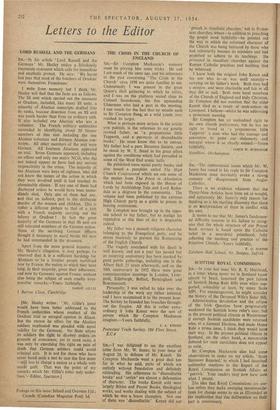THE CRISIS IN THE CHURCH OF ENGLAND SIR,—Sir Compton Mackenzie's
memory must be playing him some tricks. He and I are much of the same age, and his references to the past concerning ' The Crisis in the Church' circa 1898 are quite familiar to me. Undoubtedly I was present in the great Queen's Hall gathering to which he refers, and I was on the platform seated close to Colonel Saunderson, the fine upstanding Ulsterman who had a part in the meeting. 1 can vouch for the fact that no missile such as Sir Compton flung, as a wild youth, ever reached its target.
What is perhaps more serious in the article you publish, is the reference to my greatly revered father, as a preposterous little Tappertit, and a purveyor of discreditable hooks.' He must know this to be untrue. My father had a pure literature Society, and he stood by W. T. Stead in his great effort against the conditions which had prevailed in some of the West End music halls.
He published some social purity books. and also issued a pamphlet called The High Church Confessional which set out some of the matter from The Priest in Absolution which had been exposed in the House of Lords by Archbishop Tate and Lord Redes- dale as a disgrace to the community. The volume had been published by the extreme High Church party as a guide to priests in hearing confessions.
Sir Compton was brought up in the oppo- site school to my father, but to malign his reputation at this time of day is despicable indeed.
My father was a staunch religious character belonging to the Evangelical .party, and he strove fearlessly to prevent the Romanising of the English Church.
The tragedy associated with his death is well known, and not a year has passed but its recurring anniversary .has been marked by great public gatherings, including one in the Albert Hall 25 years afterwards, and on the 50th anniversary in 1952 there were great commemoration meetings in London, Liver- pool, Edinburgh, Belfast, Birmingham and Bournemouth.
Personally, I was called to take over the leadership of the work my father initiated, and I have maintained it to the present hour. The Society he founded has branches through- out the Empire. All this is rather extra- ordinary if John Kensit were the sort of person which Sir Compton Mackenzie imagines.—Yours faithfully,
J. A. KENSIT
Protestant Truth Society, 184 Fleet Street, E.C.4


































 Previous page
Previous page